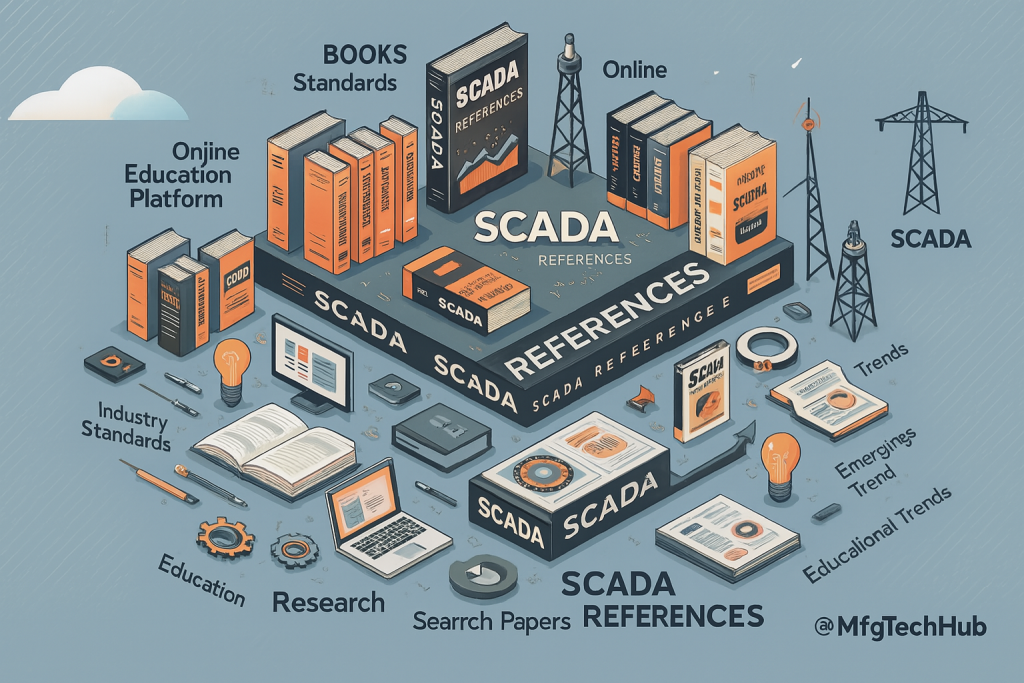SCADA References & Further Reading 
For those looking to deepen their understanding of SCADA (Supervisory Control and Data Acquisition) systems, a wealth of books, industry standards, online resources, and research papers is available. These references cover everything from foundational SCADA concepts to advanced cybersecurity, automation, and future trends.

1. Books & Publications 

Author: Stuart G. McCrady
Description: Covers SCADA fundamentals, system components, and applications across multiple industries.

Authors: David Bailey & Edwin Wright
Description: A hands-on guide for engineers, technicians, and system integrators, covering SCADA implementation and troubleshooting.

Author: William T. Shaw
Description: Essential reading for understanding SCADA cybersecurity risks and protection strategies.

Author: Ronald L. Krutz
Description: Focuses on securing SCADA networks, protocols, and industrial control systems (ICS).
2. Industry Standards & Guidelines 
- ISA-95: Enterprise-Control System Integration
- Focus: Defines how SCADA integrates with MES (Manufacturing Execution Systems) & ERP (Enterprise Resource Planning).
- Purpose: Ensures seamless communication between OT & IT systems.
- ISA-62443: Cybersecurity for Industrial Automation
- Focus: Security measures for SCADA and industrial control systems.
- Purpose: Provides risk assessment frameworks, network segmentation, and access control guidelines.
- NIST Special Publication 800-82
- Title: "Guide to Industrial Control Systems (ICS) Security"
- Published By: National Institute of Standards and Technology (NIST)
- Description: Covers SCADA security threats, vulnerabilities, and risk management strategies.
- IEC 60870-5: Telecontrol Protocol Standard
- Focus: Defines protocols for communication in electric utility SCADA applications.
- Purpose: Ensures compatibility across power distribution networks.
- OPC Unified Architecture (OPC UA)
- Focus: Standardizes secure data exchange between SCADA components.
- Purpose: Provides interoperability between different hardware/software vendors.
- ISO 27001: Information Security Management System (ISMS)
- Focus: Security framework for SCADA data management and protection.
- Purpose: Ensures compliance with global cybersecurity regulations.
3. Online Resources 


Description: Training courses, webinars, and in-depth SCADA resources.


Description: Covers latest trends, case studies, and innovations in SCADA technology.


Description: News, case studies, and white papers on SCADA & industrial automation.


Description: Discussion platform for SCADA professionals and industrial automation engineers.
4. Research Papers & Case Studies 

Description: Detailed case study on SCADA implementation in municipal water utilities.


Description: Technical research on integrating SCADA with solar, wind, and hydroelectric power systems.


Description: How SCADA systems are evolving with IoT, AI, and cloud computing.


Description: Academic analysis of threats and countermeasures in SCADA cybersecurity.
5. Educational Platforms 


Description: Online course covering SCADA architecture, components, and applications.


Description: SCADA fundamentals, PLC programming, and real-time monitoring concepts.


Description: Free resources on SCADA control strategies, system integration, and automation.
6. Visual Media & Webinars 


Description: Beginner-friendly SCADA tutorials and industry insights.




Description: Advanced SCADA system development using Ignition software.
7. Emerging Trends & Future Research 

Focus: How IoT-enabled SCADA is transforming industrial automation.

Focus: Decentralized data processing & real-time decision-making.

Focus: Using AI for predictive maintenance & autonomous process control.

Focus: Managing smart grids, water systems, and urban traffic using SCADA.
 Why Further Reading on SCADA is Important?
Why Further Reading on SCADA is Important?




8. Real-World Applications of SCADA References
SCADA references are not just theoretical; they directly guide industrial applications. By following the books, standards, and research listed above, industries achieve higher reliability and compliance.
- Energy Sector: Utilities implement SCADA standards like IEC 60870-5 to ensure compatibility across regional power grids and enhance load balancing.
- Oil & Gas: Operators use NIST 800-82 guidelines to secure pipelines and refineries from cyber intrusions.
- Pharmaceuticals: SCADA references ensure batch production aligns with FDA and ISO quality standards, maintaining patient safety.
- Smart Infrastructure: Emerging case studies highlight SCADA’s role in managing smart water networks and citywide energy monitoring.
9. Cybersecurity Best Practices for SCADA
While references like ISA-62443 and ISO 27001 define frameworks, applying them in practice requires structured approaches:
- Network Segmentation: Divide SCADA networks from corporate IT to prevent external breaches.
- Encryption & Access Control: Use VPNs, role-based access, and secure authentication protocols.
- Incident Response: Establish SCADA-specific playbooks for detecting and responding to threats quickly.
- Continuous Auditing: Perform compliance checks against standards like NIST 800-82 to ensure evolving threats are addressed.
10. SCADA Training & Certification Resources
For professionals seeking career growth, multiple platforms expand knowledge beyond traditional books:
- ISA Certifications: Recognized worldwide, offering SCADA-focused modules on integration and cybersecurity.
- Vendor Training: ABB, Siemens, and Schneider Electric provide hands-on training aligned with their SCADA platforms.
- University Programs: Graduate courses in industrial automation now include SCADA simulation labs.
- MOOCs: Online certifications from Coursera and EdX provide flexible learning with industry case studies.
11. Expanding SCADA Knowledge with Case Studies
Case studies are practical references that bridge theory and application:
- Renewable Energy: IEEE papers demonstrate how SCADA optimizes wind farm energy output by monitoring blade pitch and weather data.
- Manufacturing: Automotive plants use SCADA-driven predictive analytics to reduce downtime by 20%.
- Municipal Water: World Bank reports highlight SCADA's role in reducing leakage losses in smart distribution networks.
12. Future Opportunities in SCADA Research
The references provided form the foundation for upcoming innovations. Areas of focus include:
- Edge AI Integration: Combining SCADA with AI at the edge to reduce latency.
- Interoperability Frameworks: Enhancing cross-vendor integration through standardized APIs.
- SCADA for Decentralized Energy: Managing distributed solar, wind, and microgrid systems.
- Human-Centered Interfaces: Using AR/VR to improve SCADA operator situational awareness.
13. Conclusion
SCADA references and further reading resources provide professionals with a roadmap to master both traditional principles and emerging technologies. By combining books, standards, research, and hands-on training, engineers and operators can stay ahead of rapid industrial changes.
✅ Whether improving energy grids, automating smart cities, or securing industrial systems against cyber threats, SCADA references serve as essential knowledge hubs. The more industries and professionals invest in continuous learning, the more resilient, efficient, and future-ready their SCADA environments will become.









 Why Further Reading on SCADA is Important?
Why Further Reading on SCADA is Important?